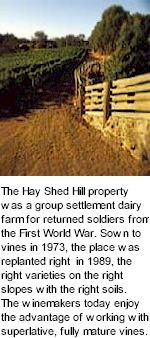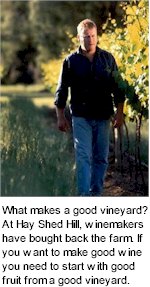


The Hay Shed Hill property was a group settlement farm for returned soldiers from the 1st World War and was originally established as a diary farm. The current homestead, considerably renovated, still has much of the original Group Settlement look and feel. Vines were first planted in 1973 to the varieties which have put Margaret River on the wine map; Cabernet Sauvignon, Chardonnay, Semillon and Sauvignon Blanc. The property was known as Sussex Vale until 1989 when it was bought by Barry & Liz Morrison. The Morrison’s were instrumental in establishing what you see today, managing to turn a fairly run down farm with a few vines into a quality grape producer with nearly 18 ha of vines. The place was planted right, the right varieties on the right slopes with the right soils. The winemakers today enjoy the advantage of working with truly mature vines.

As the old hay shed from the dairy days was a local landmark, the Morrison’s used this to create the new name for the property, Hay Shed Hill. Tools found in the hay shed provided them with the inspiration for Hay Shed’s sister label – Pitchfork Wines. In 1992 the winery was redesigned by a local architect to complement the existing house and hay shed. The effect is a visually stunning structure, which complements the existing buildings and is both striking and charming when viewed upon approach to the winery.
The Morrison’s owned the property for 11 years until 2000 when they sold to a wine investment group based in New South Wales. In 2002 the property and business was sold to Australian Wine Holdings Limited. The current winemakers bought back the farm in late 2006 and began the revival of this great vineyard and wine brand commencing with major vineyard investment and the re-design and renewal of the wine branding and labels.
Michael Kerrigan, formally the Chief Winemaker of Howard Park and MadFish Wines for the previous 12 years and a small group of partners took over the Hay Shed Hill vineyard and brands just before Christmas 2006. He was familiar with the Hay Shed Hill vineyard and its potential. He could not pass up an opportunity to be part of such an exciting winery that is producing Cabernet Sauvignon, Chardonnay, Sauvignon Blanc and Semillon wines as good as or better than any wine producer in Margaret River – and that means world class wine.

Hay Shed Hill vineyard has the mission of producing world class wines that reflect the place of their origin; wines of depth and flavour that are true to region and true to the vineyard. Small, old, hands-on vineyards and wineries like Hay Shed Hill need to be owned and run by winemakers and grape growers; people who are attached to the land and the place and wish to express its character through the wine. In the end corporations shouldn’t run boutique wine businesses.
What makes a good vineyard? If you want to make good wine you need to start with good fruit from a good vineyard. Winemakers have bought back the farm. A good vineyard has all the attributes of regional climate, in Hay Shed Hill's case the kind maritime conditions of the southwest Cape of Western Australia with its mild temperatures and dry summers – remarkably similar to the conditions of Bordeaux. Good soil, well drained gravelly loams. But most important are the individual site characteristics which have a major influence on the weather and local climate experienced by the vines. The Hay Shed Hill site is hilly with wonderful north facing slopes giving maximum sun light to the Cabernet Sauvignon and south facing slopes reducing the heat load on the Chardonnay and Sauvignon Blanc. The property is an outstanding site combining the attributes of fully mature vines with distinctive soil type and the mild weather conditions of the area to produce some of the best fruit from the region. The right varieties planted to the right slopes.
The Hay Shed Hill Block Series of wines are made from single parcels of fruit from designated blocks selected as the best grapes on the property, with hand crafted care in the winery these wines are a fine interpretation of an outstanding site. These wines showcase the best of the vineyard. Old vines, modern wines. The Pitchfork Series in slightly more modern styling. Wines complement life's experiences, clean and bright expressing the quality of the fruit not secondary influences of fermentation, oak and other processing gimmicks. The modern Australian food and lifestyle needs modern Australian wine - there is no better source of modern Australian wine than off an old Australian vineyard.
